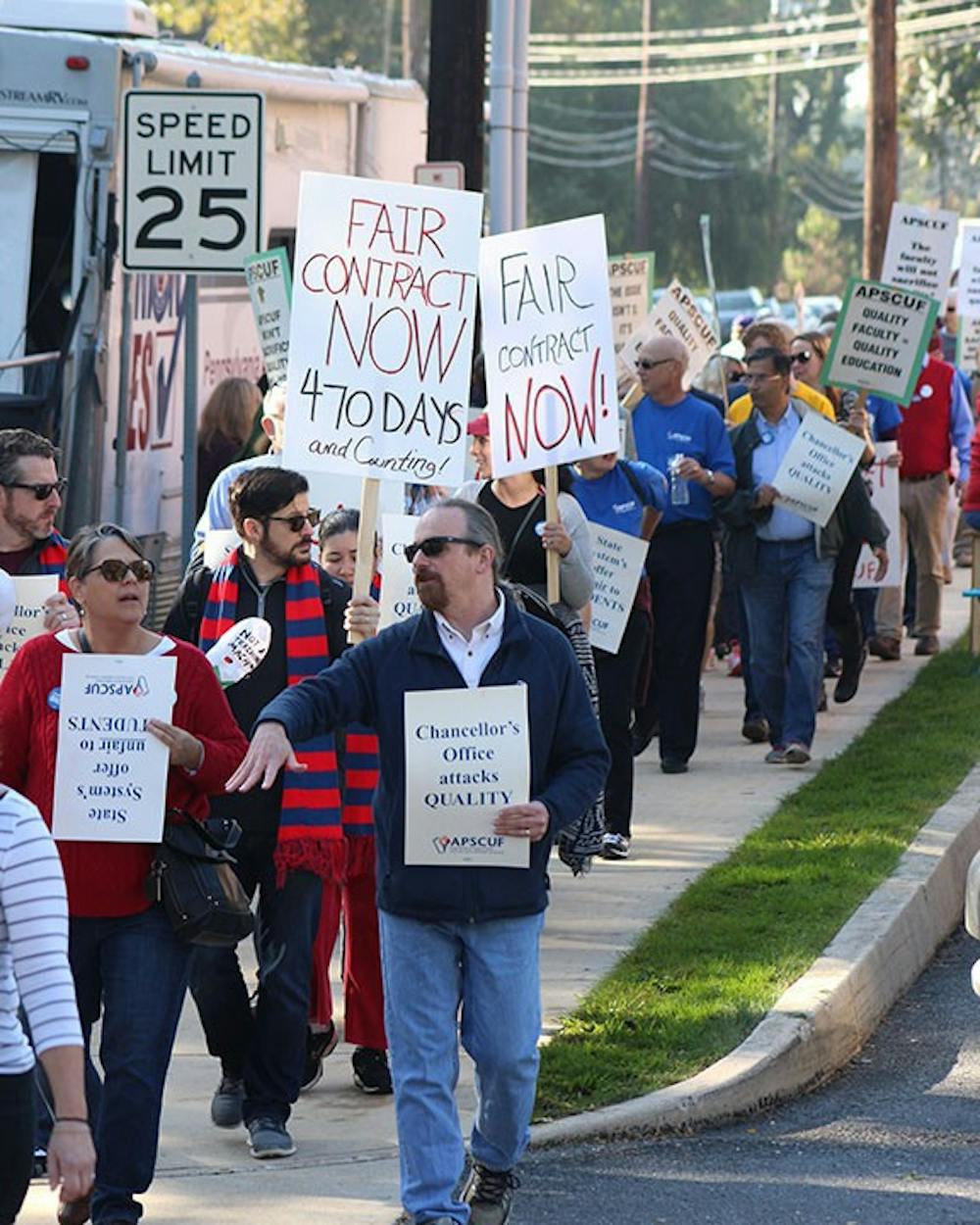As the strike date for professors nears, the union and state system beefed up their intensity last week with each side addressing students via live Facebook Q&A’s and a faculty rally in Harrisburg.
Members of the Association of Pennsylvania State College and University Faculties (APSCUF) marshaled in professors and supporters from across the state Friday to rally at the state system’s office. Several hundred people gathered with signs and banners to protest Pennsylvania State System of Higher Education (PASSHE) contract proposals and the lack of progress at the negotiating table.
With eight days left until the strike, faculty members demanded PASSHE administrators put an end to the 469 day stalemate. Their chants were heard through the brick walls of the Dixon University Center, which serves as PASSHE’s headquarters.
As the Pennsylvania Board of Governors (BoG) convened for its quarterly meeting, faculty members arrived by the busload. Shippensburg University professors stood out in neon yellow shirts, and many more walked on in blue jeans and T-shirts.
At 9 a.m. more than two dozen faculty members went inside to attend the meeting and hear their colleagues address the board. University presidents, Chancellor Frank Brogan and several state legislators, among other board members, listened to faculty comments for more than half an hour before they moved on to normal proceedings.
Many of the speakers were temporary adjunct faculty who expressed disdain for PASSHE’s proposals. In a live Facebook address Wednesday APSCUF President Kenneth Mash said adjunct faculty would either have their workload increased by 25 percent or their salary decreased by 20 percent under the proposed contract.
“Adjunct faculty perform a very specific role in higher education,” said James Greenburg, an SU professor of political science and adjunct faculty member. “We are a selective and distinct complement to tenured faculty, as we try to bring a blend of specific combination of education and focused experience to supplement and complement the needs of students to work in conjunction with tenured faculty.”
Greenburg said increasing the adjunct faculty courseload would fundamentally change the way he is able to engage with his students.
As the silence grew between speakers, the chanting of protesters grew louder — “Hey hey, ho ho, Frank Brogan has got to go,” and “What do we want? Contract. When do we want it? Now.” Inside PASSHE’s headquarters, Mash suggested opening the blinds behind Brogan to let the sunshine in, receiving laughs from faculty and administrators.
“My colleagues are here and I think you’ve heard that, not because they want to be disruptive; not because they want to create any kind of disturbance,” Mash said. “They’re here because they want you to see that they’re real people.”
Adjuncts are real people and struggling to make a living and finish degrees in some cases, Mash said. The faculty are protesting and threatening to strike, Mash said, because they believe in quality education.
When Mash finished, many of the faculty members left the chamber to go back to the picket line outside. With the arrival of more faculty, the line thickened and stretched further down the property line.
Passing cars honked their horns and the crowd cheered. Chants continued and signs were waved, some with reminders that the strike date was 13 days away at the time.
Oct. 14 marks the next and last round of negotiations before the strike. It is to last for three days, Mash said, adding negotiators will work into the night. He said APSCUF is prepared to set up picket lines on every major entrance of the 14 state system universities and in Harrisburg.
Brogan addressed students and the general public via Facebook on Oct. 4, breaking down the components of the negotiating process to layman’s terms. The chancellor said state system administrators have immense amount of respect for faculty members, offering them similar healthcare packages and proposals that they have to other unions.
The chancellor switched gears through the second half of the address and commented on the likelihood of a strike.
“There has never been a strike in the history of the Pennsylvania State System of Higher Education,” Brogan said. “Even though its been available for over 30 years since the creation of this system and it has been threatened many, many times up to and including brinkmanship to keep it from happening, this system has never had to face the full fury of a strike.”
Toward the end, Brogan said students are still responsible for going to class during a strike, unless told otherwise. The state system does not think all faculty members will participate in the strike and some may still hold classes.
During Mash’s live Facebook address he said all union members are expected to participate.
“We’re a democratic organization. We can’t force anyone to do anything,” he said. “Our expectation is that every faculty member will be on that picket line until we have some sort of tentative contract.”
He said as he travels across the state system he feels a good deal of solidarity from the faculty. While some faculty may turn their backs on their colleagues, Mash said, the vast majority of faculty will be on the picket line.
“Once we’re off the job, we’re off the job,” he said.
Mash said the union will continue to talk with PASSHE administrators to agree on a contract and prevent students from being stuck in the middle.
Nearing the end of the Q&A, Mash said, “Something is broken and together we have to work to fix it.”





The Slate welcomes thoughtful discussion on all of our stories, but please keep comments civil and on-topic. Read our full guidelines here.